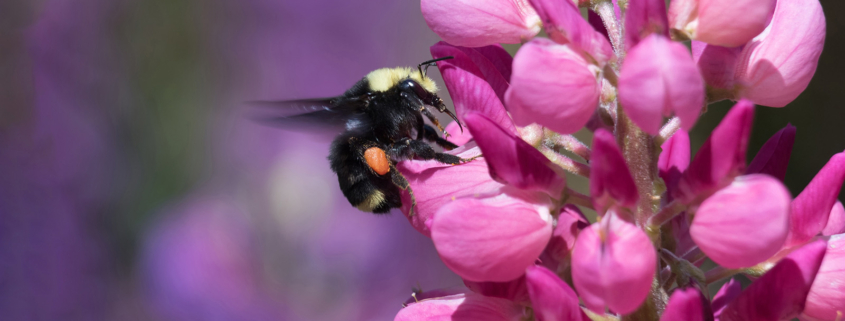New White Paper: WHC White Paper Supporting the Global Pollinator Population through Local Action
SILVER SPRING, MD, JUNE 23, 2021 – Wildlife Habitat Council (WHC) offers a new white paper available for download today, Supporting the Global Pollinator Population Through Local Action. The white paper is sponsored by BASF and is available for free on our website.
This publication serves as an extension of the 2016 WHC white paper, Prioritizing Pollinators in Corporate America: How Companies Can Align Their Business Needs with the National Strategy to Promote the Health of Honey Bees and Other Pollinators. The new release provides an update on the prior publication’s focal species (bees and butterflies in the U.S.), while also exploring the conservation efforts of companies around the world, as well as efforts that focus on lesser-known pollinators like moths, nectivorous bats, hummingbirds and beetles.
In the time since Prioritizing Pollinators in Corporate America was published, the need to support the world’s pollinators has, in many ways, grown more dire, as evidenced by the declining numbers indicated in recent monarch butterfly counts and studies on bee populations. As pollinators are key to global biodiversity, food security and economic prosperity, it is critical to reverse these losses now.
Fortunately, pollinator conservation can be conducted on properties of any size, and in every geographic region. Pollinator projects are, therefore, one of the most accessible and popular forms of corporate conservation, and companies worldwide are taking local action to rectify this global issue. Featured case studies include:
- Covia: Planta Lampazos – Nuevo León, Mexico
- DTE Energy: Washington-10 Compressor Station – Michigan, U.S.A
- ExxonMobil: ElectroPhos – Florida, U.S.A
- Freeport-McMoRan: Copper Queen Branch – Arizona, U.S.A
- General Motors: GM Powertrain Uzbekistan – Tashkent, Uzbekistan
- ITC Holdings: ITC Transmission Line Right-of-Way at Chippewa Nature Center – Michigan, U.S.A
- Marathon Petroleum Corporation: Galveston Bay Refinery – Texas, U.S.A
- Waste Management: Kirby Canyon Recycling and Disposal Facility – California, U.S.A
Sponsored by BASF, this white paper includes a forward from the company which states, “Together, with the Wildlife Habitat Council and its member companies, BASF is transforming its dedication to wildlife stewardship and habitat enhancement into sustainable programs. We will continue to support this important work and encourage our employees, community volunteers and like-minded companies to do the same.”
About Wildlife Habitat Council:
For 33 years, WHC has been promoting and certifying ecological stewardship action on corporate lands through partnerships and education. Since only 10-15% of the world’s land surface is protected, private lands provide an essential opportunity for restoring and protecting biodiversity. As the only international conservation NGO focused exclusively on the private sector, WHC provides a framework for voluntary conservation action on a wide variety of corporate lands. WHC’s corporate members represent some of the leading national and multinational corporations seeking to support sustainable ecosystems and the communities that surround them. These efforts have resulted in more than 1,000 certified programs across 47 states and 28 countries.


